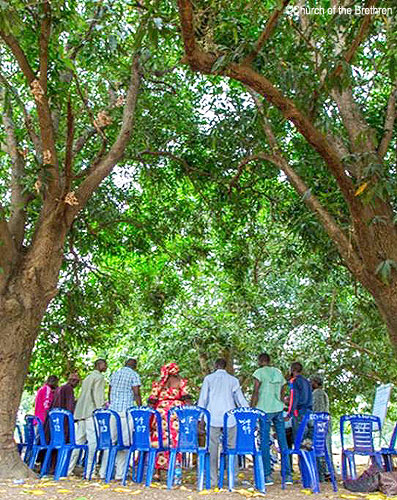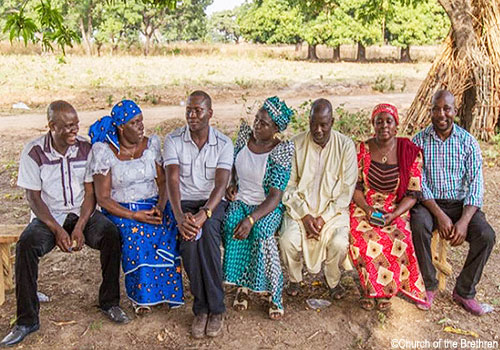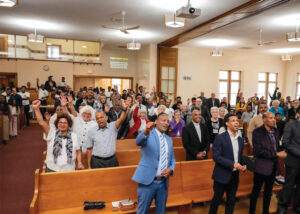Musa* grew up in a close-knit family that did not change even as they became adults. The siblings looked out for each other and their parents. When Boko Haram insurgent activity increased in 2014, the family became concerned for the welfare of their parents and tried to get them to move to a safer place. The parents refused, saying that at their age, they had no interest in running away from home.
During the latter half of 2014, Boko Haram successfully took over more and more territory in northeast Nigeria, carrying out their destructive activities as they went. Often they would arrive in a community suddenly and people would run for their lives. Musa’s community suffered one of those attacks, in which people scattered into the countryside, only to regroup some time later to assess who was living, who was dead, and what had been stolen or destroyed. People came to him and told him that they had seen his father’s lifeless body. As hard as it was to accept this news, it was even harder for him to tell his mother.
Musa shared this story with a group of 20 other members of his community—men and women, Christian and Muslim—at a trauma resiliency and awareness workshop supported by Mennonite Central Committee, in cooperation with Ekklesiyar Yan’uwa a Nigeria (EYN, the Church of the Brethren in Nigeria).
Mugu Bakka Zako, MCC peace coordinator, shared with the group that it is very important to tell their stories to each other. He said that the road to healing trauma starts with telling your story to others who care. Tears are part of the healing.
Displacement and trauma
People fled from the Boko Haram in stages. Many thought they would be safe in neighboring villages, but when those were attacked, they were forced to flee again. Some squatted with friends or relatives. Others lived in schools or took shelter in abandoned houses or sheds. Most lost their homes, their food stocks (which they had planned to feed their families until harvest at the end of November this year), and other personal possessions.
At the beginning of December 2014, the Internal Displacement Monitoring Centre (IDMC) estimated that there were 1.5 million people displaced within Nigeria, and approximately 150,000 Nigerian refugees who had fled to the neighboring countries of Niger, Cameroon, and Chad.
EYN is the largest Christian denomination in the areas affected by Boko Haram. EYN leadership estimates that at the height of the displacement, 70 percent of the church’s estimated 1 million members and adherents were not living in their home communities. Approximately 100,000 have found refuge in one of the many camps that have been set up for displaced people.
As the security situation changes, some of the displaced people are now returning home. However, particularly when Christians return home, they meet an uncertain welcome. In some cases, neighbors who are Muslims betrayed the Christians to Boko Haram. It also is known that many Muslims suffered under Boko Haram.
Nevertheless, trust that may have been fragile to begin with is now broken. Traumatized people returning home face not only destroyed properties and the loss of loved ones, but also uncertainty in relationships with their Muslim neighbors.
As this trauma project was being developed, EYN president Samuel Dante Dali commented, “Reconciliation is not a choice but a necessity. The primary goal is to see that the present society is healed; the process that brings about the healing is reconciliation. Inasmuch as reconciliation is very painful in this context, it is a necessity because that is the only process that will bring about healing.”
Mennonite Central Committee (MCC) has responded to EYN’s call to address trauma by putting together a one-year project developing a trauma resiliency model contextualized for Nigeria. Seven individuals from MCC, EYN, and the ecumenical Christian organization called TEKAN Peace, have been trained as trauma facilitators at a HROC (Healing and Reconciling our Communities) training in Kigali, Rwanda. They in turn are training more facilitators, who are facilitating groups of people to come to terms with their trauma while working toward reconciliation and possible forgiveness, to stem the tide of violence. The project is designed around a sustainable model, training “listening companions” with limited resources.
Rifkatu’s story
Rifkatu held her month-old child as she told her story. She is one of those who ran for her life when the Boko Haram suddenly attacked her community. She was almost nine months pregnant with her tenth child, working on her farm with two of her other children, when they heard gun shots. Within minutes they saw people running from the violence. She wanted to return to town to find the rest of her family, but her children begged her to run. Thankfully, her family soon came, running with the rest of the community. Together they hiked into the surrounding hills, where they hid for a number of days before moving on toward the safety of Cameroon.
After two more days Rifkatu could run no further. Her body was wracked with fatigue, so she entered the home of a local resident and begged for shelter and rest. The woman of the house gave Rifkatu a room and there she gave birth to a baby boy, Ladi, meaning Sunday, the day he was born.
Ibrahim’s story
Ibrahim was one of those chosen to participate in the third trauma resiliency workshop. The group met under a “cathedral” of mango trees in a community of displaced people who had been resettled in Nasarawa State with the help of EYN and the Church of the Brethren. Ibrahim shared his own story of trauma escaping from the clutches of the Boko Haram.
Ibrahim described how he had been captured by Boko Haram and was sitting in the front seat of their stolen vehicle between the driver and a fighter carrying a gun. Five other people were captured along with him. All were being taken to the headquarters of the Boko Haram in the Sambisa Forest.
His captors asked him if he was a Christian. Ibrahim had no problem attesting to his faith in Jesus Christ despite knowing that his chances of survival would be much higher if he told them that he prayed to Allah five times a day. His fellow captives were not convinced by this bold strategy, but when Ibrahim grabbed the gun from the fighter on his right and leaped out the car door, they did not hesitate but ran after him into the bush.
The startled Boko Haram fighters immediately took off running after Ibrahim. Slowly they were gaining on him so he discarded the gun and kept fleeing. His pursuers picked up their gun and stopped running. When asked if he had thought of turning the gun against the Boko Haram, Ibrahim said, “I wanted to save my life. We are not taught to kill. I didn’t even think about shooting them.”
As Ibrahim shared his story with the group, he came to the part of forgiveness. He told the group that he was not ready to forgive the Boko Haram for the way they had destroyed his life and the lives of his community. He felt that justice should be done before forgiveness could be considered.
Asabe, one of the facilitators, responded to Ibrahim by sharing her own story of forgiveness and how it had been such an important part of her journey toward healing. She shared how her sister, a Muslim woman, had been the one to challenge her by asking, “Are Christians not the ones who preached forgiveness?”
By the end of the three-day workshop, Ibrahim knew that he had discovered something he had never understood properly before, despite a lifetime of active involvement as a member of EYN. As he shared what he had learned with other members of his community, they complained that it was unfair that he had been chosen for the workshop and that they had been left out of this learning and healing experience. Several hours of sharing later, these friends expressed their gratefulness to Ibrahim for having passed on what he had learned, particularly around the gift of forgiveness.
As each day of the trauma workshop passed and Rifkatu returned to sleep with her family, they started to notice a change. “I’m happy now,” she said. “I have been healed from the trauma I have gone through. My conviction now is to pass this healing experience on to the many others from my community who have also experienced the horrors that create trauma.”
Other testimonies
Isa is Muslim. In October last year he was attacked at his home by Boko Haram. His brother was slaughtered, but he and his family were able to run away, leaving his 90-year-old parents behind. He and his family fled to Yola and finally to Abuja.
Isa belongs to a mixed family of Christians and Muslims. They used to live in peace with the Christians in their family and the community. The families visited each other during Christmas and Sallah (Muslim) festivals. He fears that the crisis has ruined the existing relationship between these groups. He says, “I wonder how my immediate Christian relatives will cope with the situation on the ground knowing that the crisis will greatly affect them.”
Isa attended two workshops on trauma healing organized by EYN and MCC. “Initially, I had darkness in my heart,” he reports, “though I don’t know the people that killed my brother. But I had this bitterness in my heart and wished that something bad should happen to them. I tell you, people are going home purposefully to take revenge on the people responsible for their pain. This is creating a lifetime of hatred among families and groups of people.”
Isa reflects on the workshops he attended. “[They] have helped me greatly because I have learned a lot from the experiences shared by people. I see Christians sharing all that happened to them, how difficult their situation has been, and how they are being healed and saying they have forgiven the people that killed their loved ones and looted their property. At first it was unbelievable, because I thought it could not be possible, due the level of hurt they have been through. I imagined myself in their shoes and it was painful. To an extent, I am healed from what happened to me and have changed the way I look at these crisis issues. I hope to reach out to as many Muslims in my community as well, but I can’t guarantee you that this is going to be easy. Aside from being hungry, people are still angry and have hatred buried deep inside them.”
Hannatu is married to a pastor and has two children. The family lived in a community where they had Muslim neighbors. On the day of the Boko Haram attack, her husband had already fled to a safer area, but she remained at home to harvest their crops. She was at a neighbor’s and heard gunshots. As she ran back to her home, she saw the Muslim neighbor coming with a knife, seeking to kill her husband. Fortunately her husband was not at home. Hannatu also fled the area and met her husband in Yola. They then traveled to Abuja where they attended a trauma workshop.
Hannatu say, “The workshops have helped me forgive my neighbor, who wanted to kill my husband.”
*Full names of trauma healing participants and those giving testimonies have been omitted.
—Dave Klassen worked with Mennonite Central Committee in Nigeria, where MCC is a partner with Ekklesiyar Yan’uwa a Nigeria (EYN) providing trauma healing workshops. Carl and Roxane Hill are co-directors of the Nigeria Crisis Response of the Church of the Brethren, in a cooperative effort with EYN.
See also:
Learning to be good neighbours in Nigeria








Leave a Reply
You must be logged in to post a comment.